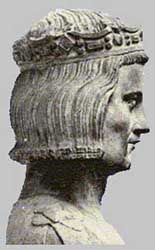 |
Stories & Legends
St. Louis, Warrior and Saint
Hugh O’Reilly

St. Louis IX, the warrior King and glory of France
|
Reading the so sublime and so beautiful life of St. Louis IX, a model King, one has to ask this question: Did the King of Heaven ever have a more faithful servant on this earth than this crowned angel?
What Catholic heart would not be moved with admiration in contemplating the spirit of St. Louis: his strong and pure sentiment of duty, his exalted and meticulous regard for justice, his rare delicacy of conscience that led him to repudiate even the illegitimate acquisitions of his predecessors, his tender solitude for his neighbor, his immense charity, which he lavished not only on his family and close friends, but even the lowest of his subjects.
And yet, to all these saintly virtues, he knew how to unite the most fearless bravery. He was at the same time the best warrior as well as the best Christian of the Kingdom.
He was chosen as arbitrator in all the great disputes of his time - between the Pope and the Emperor, between the Barons of England and their King. Held captive by the infidels, even there, captive and under chains, he was chosen by them as their judge.

Sainte-Chapelle, a brilliant jeweled reliquary |
He embarked twice into pagan lands, and there he met with captivity and death. It was a type of martyrdom, the only one befitting his stature and, indeed, the only worthy of him. On his deathbed he dictated to his son his memorable instructions, the most beautiful words ever uttered from the mouth of a king.
Just before breathing his last, he was heard to whisper in a low voice, “O Jerusalem! O Jerusalem!” Was it to the heavenly city or the earthly one that he addressed this sublime lament or expectation?
He was the last of the Crusaders, the last of the truly Christian Kings, and the greatest of them.
He left us two immortal monuments, his oratory and his tomb – Sainte-Chapelle and Saint-Denis - both pure and simple, and like his own soul, towering heavenward. He left yet another monument, also immortal in the memory of the people – his oak of Vincennes.

Based upon and translated from
Charles de Montalembert, Histoire de Sainte Elisabeth de l’Hongrie
Paris: Tequi, 1930, vol. 1, pp. 41-43.
Posted September 6, 2008


Related Topics of Interest
 St. Louis IX, King of France St. Louis IX, King of France
 A Speech by Charlemagne to His Nobles A Speech by Charlemagne to His Nobles
 The Middle Ages, A Forest Filled with Symbols The Middle Ages, A Forest Filled with Symbols
 Ranulf of Chester Ranulf of Chester
 Refuting Lies about the Middle Ages Refuting Lies about the Middle Ages
 The Cathedral: Symbol of Paradise The Cathedral: Symbol of Paradise
 The Symbolism of the Sword The Symbolism of the Sword


|
Legends | Religious |
Home | Books | CDs | Search | Contact Us | Donate

© 2002-
Tradition in Action, Inc. All Rights Reserved
|
 |
|